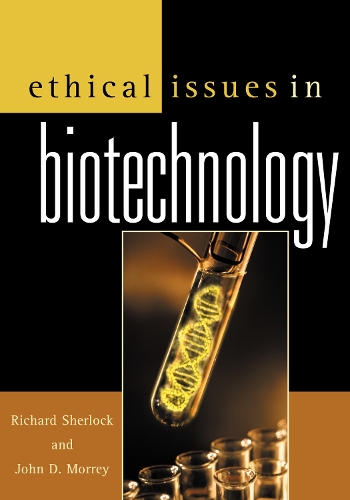
Ethical Issues in Biotechnology
(Paperback)
Publishing Details
Ethical Issues in Biotechnology
By (Author) Richard Sherlock
Edited by John D. Morrey
Contributions by Nicholas Agar
Contributions by Miguel Altieri
Contributions by American Association for the Advancement of Science
Contributions by F H. Bach et. al
Contributions by eds.
Contributions by Coalition of Americans for Research Ethics
Contributions by Carl Cohen
Contributions by Ronnie Cummings
Bloomsbury Publishing PLC
Rowman & Littlefield Publishers
9th October 2002
United States
Classifications
General
Non Fiction
Medical ethics and professional conduct
Biotechnology
Bioethics
174.25
Physical Properties
Paperback
358
Width 173mm, Height 261mm, Spine 30mm
1152g
Description
This is not another text in bioethics or medical ethics. Neither is it a text in environmental ethics. This work focuses on biotechnology broadly conceived to include the development of genetically engineered plants and animals, genetically altered animal organs for human transplant, genetic testing and therapy for human beings and, finally, animal and human cloning.
Reviews
This will be the field-defining book for the ethics of biotechnology. It is the best one-volume guide to the issues currently being debated with respect to the new genetic technologies, and the only one that illuminates the connections between medical and agricultural applications. Teachers will use it in the classroom, but beyond that it should be thought of as an indispensable read for anyone who wants to be informed about science, ethics, and public policy. -- Paul B. Thompson, Michigan State University, W.K. Kellogg Professor of Agricultural, Food, and Community Ethics
Richard Sherlock and John Morrey have developed a timely anthology on the ethical dimensions in biotechnology that is both scientifically sound and philosophically provocative. Engaging readings as well as a compendium of cases offer many formats for teachable dialogue between instructor and students. The questionsscientific, philosophical, political, legal, moralexamined through Ethical Issues in Biotechnology illustrate the urgent need for critical ethical scholarship in this rapidly emerging field. This anthology meets that need. -- Courtney S. Campbell, Oregon State University
The most substantial and sophisticated treatment of biomedical ethics that I have come across recently, and a treatment that remains quite accessible to undergraduate students. -- Dr. S. N. Fratantaro, Providence College
It is refreshingly atypical that the book does not just focus on human cloning or human genetic screening but takes on the whole topic of biotechnology. It is enterprising and clever to have a book edited collaboratively by a biologist and a philosopher, and the result is a balanced treatment. The readings have already been proven successful with students. With diagrams, study cases, examples, and suggestions for further research, the book is a comprehensive and well-expressed introduction to the science and ethics of biotechnology. * Research News and Opportunities In Science and Theology *
All who are involved in ethics and biotechnology should be immensely grateful for [Sherlock and Morrey's] efforts. Balanced and teachable, Ethical Issues in Biotechnology is a valuable contribution to the field, and a must-have for those teaching either undergraduates enrolled in upper-level courses, or graduates students, across the disciplines of science and humanities. * Technology and Culture *
Sherlock and Morrey cover a fascinating and engaging set of cutting edge issues. This work covers biotechnology in the broadest sense of the word, contains masterfully selected readings, and challenges the reader to think into the future. It should be very useful to college, graduate, and professional students. -- Steven Post, Case Western Reserve University
Author Bio
Richard Sherlock is professor of philosophy at Utah State University. John Morrey is research associate professor in the Department of Animal, Dairy, and Veterinary Sciences at Utah State University. Professors Sherlock and Morrey teach an undergraduate course on ethical issues in biotechnology.
